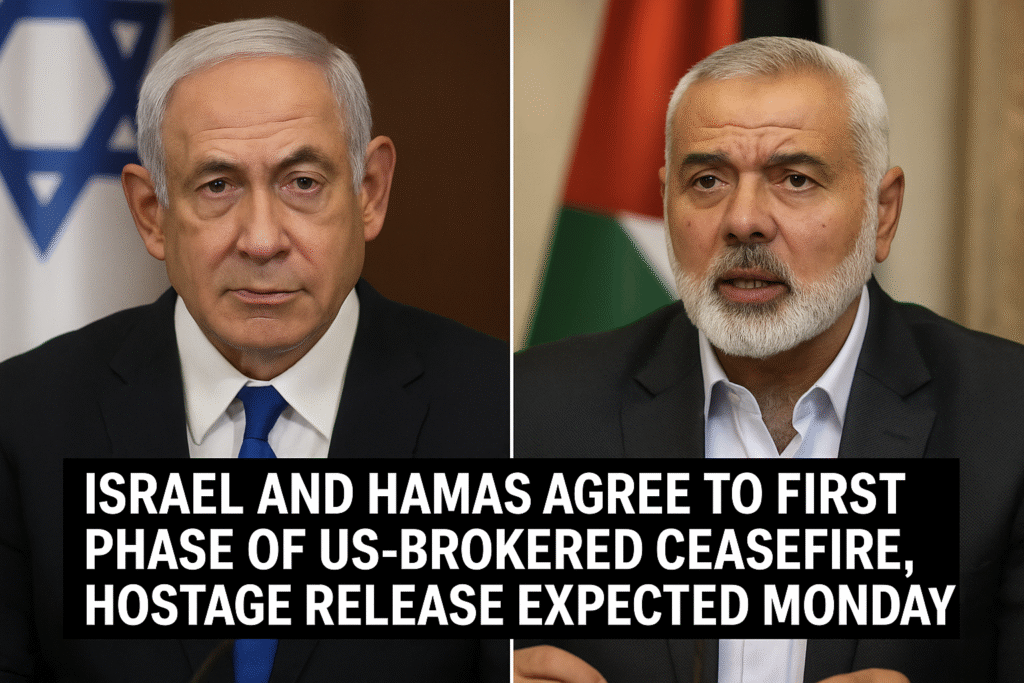By Harshit | October 9, 2025 | Sharm El-Sheikh, Egypt | 11:00 AM EST
A Historic Breakthrough in Gaza Conflict
After more than two years of war that has devastated Gaza and strained regional stability, Israel and Hamas have agreed to the first phase of a US-brokered ceasefire deal. The plan, announced Friday, outlines the release of all hostages held in Gaza, a partial Israeli withdrawal to an agreed point, and the release of selected Palestinian prisoners.
The agreement, mediated in Sharm El-Sheikh with support from Egypt, Qatar, Turkey, and the United States, is being hailed by world leaders as a “historic moment” — though deep concerns remain about unresolved issues such as Hamas’ future governance of Gaza and disarmament.
Trump Announces Hostage Release Timeline
US President Donald Trump, who has cast himself as the driving force behind the negotiations, said that hostages are “likely to be released on Monday.” However, his statement avoided addressing key sticking points that could complicate implementation.
Trump’s remarks, delivered in Washington, focused on the humanitarian relief that families of hostages have long awaited. “It’s going to be a beautiful moment, very soon,” he said, emphasizing that service members and aid convoys will be prioritized.
Netanyahu Government to Vote on Deal
Israeli Prime Minister Benjamin Netanyahu is expected to convene his cabinet today to formally vote on the ceasefire proposal. Only after government approval can the first phase of the deal move forward.
The Israeli Prime Minister’s Office confirmed that the government will review the full terms before any withdrawal or prisoner exchanges are carried out. Observers note that Netanyahu faces internal pressure from hardline factions who view the concessions as risky, even as much of the Israeli public has welcomed the possibility of an end to fighting.
Scenes of Relief and Concern in Gaza and Israel
Across Gaza, residents erupted in cautious celebration following the announcement, with many expressing disbelief that a ceasefire could finally bring an end to what they described as “two years of nightmare.”
Salma Altaweel, an aid worker with the Norwegian Refugee Council, told CNN: “We thought it would never end… Finally it feels like this nightmare will come to an end.” Yet she warned that Gaza remains in ruins. “The road ahead is long. The country is completely devastated. It will require massive efforts to rebuild.”
In Israel, families of hostages voiced relief but demanded swift implementation. “We cannot celebrate until we see our loved ones back home,” one relative told reporters in Tel Aviv.
Egypt Hails “Triumph of Peace”
Egyptian President Abdel Fattah el-Sisi, a central mediator in the talks, described the agreement as a “triumph of the will for peace over the logic of war.” Speaking from Sharm El-Sheikh, he said: “This agreement does not only close the chapter of war, it also opens the door of hope for the peoples of the region for a future defined by justice and stability.”
Global Leaders React
Leaders worldwide praised the breakthrough:
- Turkey’s President Erdogan thanked Trump for his role and vowed to monitor the deal closely.
- UK Prime Minister Keir Starmer called it a “moment of profound relief” for civilians in Gaza and hostages’ families.
- Canada’s Prime Minister Mark Carney credited “essential leadership” from Trump and regional mediators.
- India’s PM Narendra Modi expressed hope for lasting peace and increased humanitarian aid.
- Russia, Pakistan, Australia, New Zealand, and Argentina also issued strong endorsements, framing the deal as a turning point in Middle East diplomacy.
Unresolved Questions
Despite the optimism, major questions remain unanswered. The deal does not explicitly address Hamas’ disarmament, the long-term governance of Gaza, or broader issues tied to Palestinian statehood — all of which could reignite conflict if left unresolved.
Analysts warn that while the ceasefire is historic, it represents only the beginning of a complex and fragile process. “This agreement buys time, but peace requires much more than a temporary truce,” one Middle East expert told reporters.
Looking Ahead
If approved by Netanyahu’s cabinet, the first phase of the ceasefire will begin within days, with hostages expected home as early as Monday. Aid organizations are already preparing to mobilize relief supplies into Gaza, though logistical hurdles remain.
For now, the announcement marks a rare moment of hope in a conflict defined by devastation. Whether it becomes a true turning point will depend on the political will of both sides — and the international community’s commitment to ensuring accountability.

